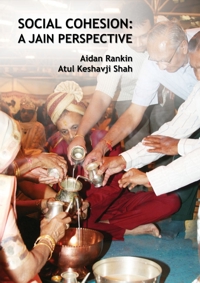‘War is merely the continuation of politics by other means,’ wrote the Prussian officer and historian Carl von Clausewitz in his treatise on the phenomenon of war. In this age of ‘homeland security’ and ‘war on terror’, his words resonate. They also capture the essence of modern British politics, which has evolved into a pattern of continuous, low-level conflict. Politicians of all parliamentary parties speak in terms of ‘victory’ and ‘defeat’, of ‘trouncing’ or ‘routing’ their opponents, of ‘campaigning tactics’ and ‘political battles’ and claiming the ‘scalps’ of their opponents.
These phrases are highly significant, because they express the underlying adversarial character of our politics, which constrains the participants in both thought and action. The language also perpetuates conflict, creating a vicious circle. Jain ethics draw no real distinction between thought, speech and action. In a chain reaction, violent thoughts and violent speech lead to violent acts. Thoughts and speech are forms of action in themselves, and violence means far more than crude physical force.
Looked at from this perspective, we are living in quite a violent political culture. This is reflected in the cult of ‘strong government’, where strength is equated with stubbornness and punitive campaigns ‘targeting’ groups such as single mothers, refugees or benefit claimants, and a more aggressive relationship with the rest of the world.
Even the architecture of our parliamentary system appears to be based on conflict. Government and Opposition benches face each other like serried ranks. The parliamentary process revolves around point scoring, trivialised debates, bullying tactics, ridicule and ‘ambush’ of opponents. Prime Minister’s Question Time has been compared, with good reason, to a Punch and Judy show.
These antics are reinforced by a ‘winner-take-all’ electoral system in which a monopoly of power is enjoyed by a party with a minority (sometimes quite a small minority) of the vote - the so-called ‘electoral spoils’. It is significant that the most visible symbols of our parliamentary system are a portcullis and chains, hardly emblems of liberty and inclusion, but indicators of exclusion and defensiveness.
Despite - or rather because of- - the manic adversarialism of Westminster, politics is increasingly dominated by a narrow class whose members, of whatever party, have more in common with each other than the wider electorate. The adversarial system entraps those who seek to bring greater openness to the political process. It appeals to the wrong human qualities: petty ambition, at the expense of concern for the public good, adherence to one-sided certainty, at the expense of the quest for truth, which in the context of Punch and Judy politics is dismissed as ‘na¨ıve’.
Adversarial politics entraps those who wish to make the political system more transparent, open and inclusive, because it confuses reconciliation with ‘weakness’ and elevates point-scoring above any meaningful discourse. Most seriously, it is proving ill-equipped to address the concerns of an increasingly diverse and complex British society, within an interconnected world.
This is why disillusionment with ‘conventional’ politics - and with it hard-won democratic rights - is at its highest. This does not mean that interest in politics has disappeared. On the contrary, single-issue campaigns, such as the antiwar movement, animal rights and environmental issues (specific or general) are appealing to large sections of the population, especially the young. This is a positive form of political engagement, but it is also inherently self-limiting and can lead to positions of fanaticism and one-sidedness that undermine the original purpose of the campaign.
At the same time, the climate of disillusionment has a shadow side. This is expressed in the rise of racist parties and a growing climate of xenophobia, to which ‘mainstream’ politicians pander for short-term gain. It is expressed equally in the emergence of fundamentalisms based on exclusion, dogmatism and the assumption of absolute truth, in other words adversarialism par excellence. For politicians and concerned citizens alike, the challenge is to engage with these new political forces, addressing grievances without surrendering to the shadow politics of fanaticism or bigotry.
What is needed is a radical extension and renewal of the democratic process - radical in the literal sense of addressing a problem from the roots upwards. This means an electoral system in which every vote counts and all shades of opinion are articulated. It means the greater use of the referendum, nationally and locally - as in Switzerland, for example - because electors are treated as mature adults with the right and duty to participate and understand. At national and local levels, power would be devolved from unrepresentative quangos to elected representatives.
Such reforms would have two main effects, which seem to be opposites but are in fact complementary principles. At one level, it would ensure diversity of representation, including greater participation by women and minority groups. At another, it would end the perpetual two-party conflict and replace it with a search for consensus and compromise. The architecture of adversarialism needs to be replaced by the semi-circular structures characteristic of other European parliaments, including the devolved assemblies of Scotland, Wales and Northern Ireland. This change would be more than symbolic, as it would mark a departure from point-scoring, conflict-based partisanship.
Constitutional reform of this type is closely connected to questions of social cohesion, for two reasons. First, it addresses the democratic deficit, by which many individuals, communities and shades of opinion are marginalised or suppressed, increasing polarisation and mutual distrust. Secondly, it affects the way politicians and opinion-formers behave towards each other and the example they set to society as a whole. The move beyond adversarialism lifts a terrible burden from the shoulders of the political classes, increasing their range of possibilities and scope for independent thought.
A political system reformed on these lines reflects the Jain principle of Anekant, which acknowledges that there are many paths to the truth, and pursues that truth with humility and respect for others. It is a principle that has meaning and relevance outside Jainism, especially in a diverse society where there is a need for constant mediation and questioning.
The details of economic policy remain outside the scope of this paper. It is not the task of Jainism to dictate such terms, or to choose between approaches associated with ‘left’ or ‘right’. But the implementation of such choices can be informed by concern for social and environmental well-being, and recognition of spiritual as much as material needs. This approach would restore to economics its true meaning, ‘the law of the house’, the households in question being society and the planet.
- A fair electoral system in which every vote counts and political diversity is reflected;
- An encouragement of diversity at every level in the political system to ensure representation of minorities;
- A recognition that people from minority cultures can have timeless solutions to modern-day problems - their numbers should not conceal their wisdom, whose quality needs to be appreciated and celebrated;
- Replacement of adversarial architecture of the House of Commons with a semi-circular structure;
- Greater use of referenda at national and local levels;
- An end to ‘Punch and Judy’ politics;
 Aidan Rankin
Aidan Rankin
 Dr. Atul Keshavji Shah
Dr. Atul Keshavji Shah
